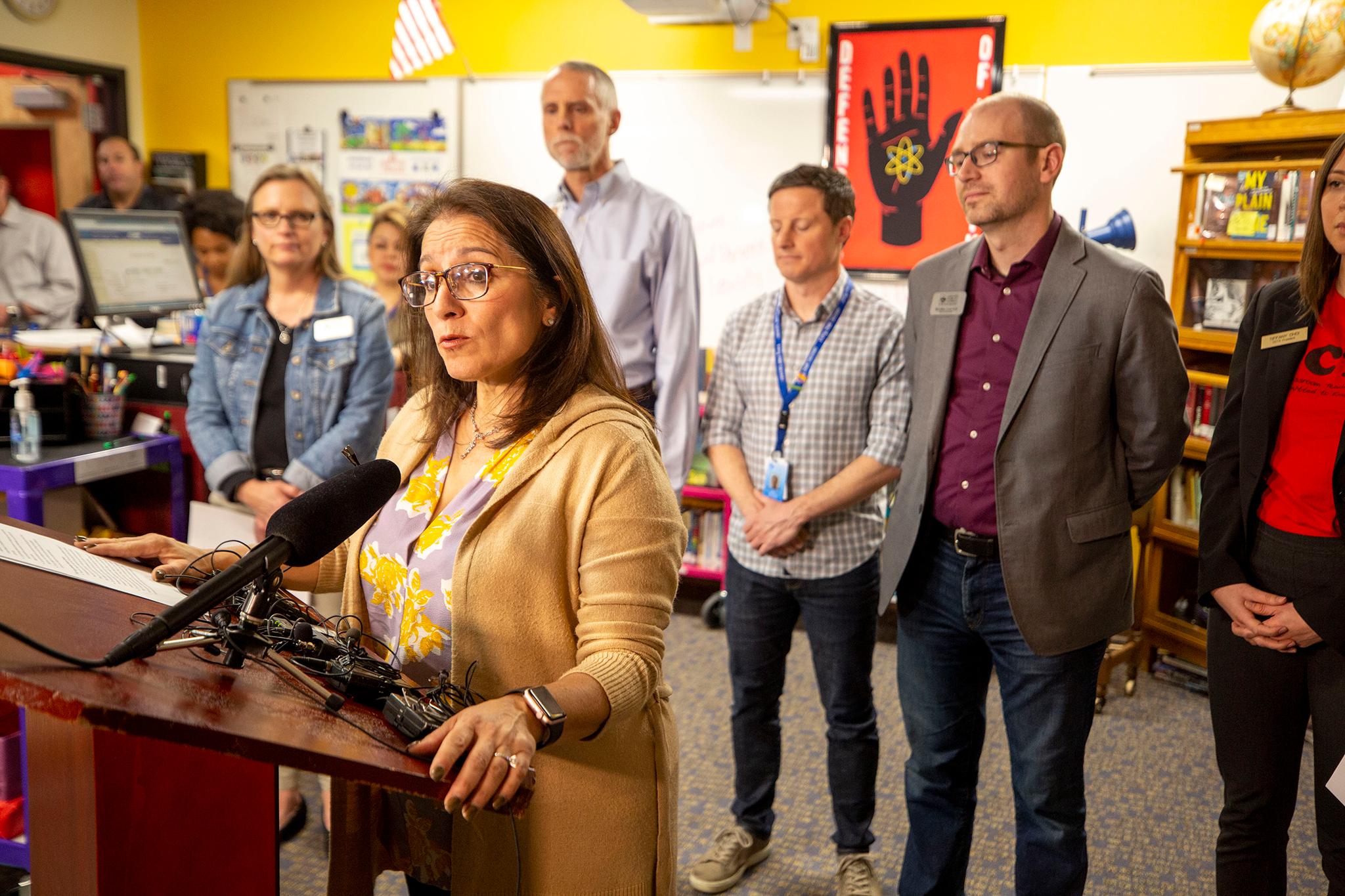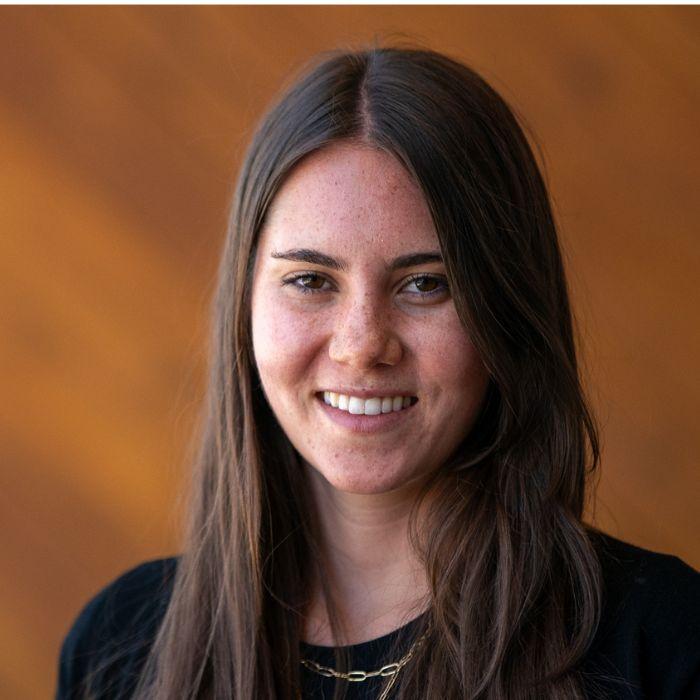
Denver Public Schools Superintendent Susana Cordova is resigning from her position after two years to work at the Dallas Independent School District as the Deputy Superintendent of Leading and Learning.
“I am sad to be leaving Denver, but I will be eternally grateful to everyone I have worked with and learned from over the past decades,” she said in a statement Friday afternoon. “I will work with the board and the senior-leadership team over the coming weeks to ensure a smooth transition, and I want you to know that Denver will forever be home to me.”
Cordova said she wasn’t looking for a new position but was approached by the Dallas school district. “I felt like I owed it to myself to consider it,” she said, adding that Dallas reminds her of the Denver she grew up in.
The child of Mexican-American parents and a first-generation college graduate, Cordova was educated in Denver Public Schools and spent 31 years working in the district. Cordova has been a classroom teacher, a principal, chief academic officer and chief schools officer. She will be the deputy superintendent of leading and learning in Dallas.
Under her tenure, she led negotiations for the district during a turbulent teacher strike, helped the district weather a “bomb cyclone” snowstorm, budget cuts and reorganizations, and a global pandemic.
“Throughout all of this, we've invested in our classrooms and our teachers; strengthened our connections and collaboration with our educators and leaders; elevated equity as the defining value driving all of our work.”
Cordova said she is most proud of her work on pushing equity to the forefront. More educators received training in culturally responsive practices, and the district adopted a Black Excellence resolution that requires DPS to monitor and accelerate academic achievement among Black students. Over the next two years, the district will revamp its K-12 curriculum to incorporate more Black, Indigenous and Latinx voices.
Cordova said despite the global pandemic and the sudden move to remote learning, the district had record-high graduation rates, record-low remediation rates and more students than ever taking and passing rigorous courses.
She and other district leaders more recently came under fire from parents for the decision to delay in-person learning at the beginning of the school year while other districts moved forward. The criticism amplified after returning elementary school students to in-person learning recently, only to move them back home to remote as COVID-19 rates skyrocketed.
Board chair Carrie Olsen called the departure “bittersweet.”
“We’ve been so lucky that she’s been part of DPS throughout her life as a student, as a mom, as a leader and as a trailblazer,” Olsen said.
Cordova was DPS’ first Latina superintendent and only one of two women of color to lead the district. She conducted numerous Facebook Live sessions with community members in both English and Spanish.
“I have watched her lead with her heart and her soul, with grace, humility and passion for her mission, to ensure that all DPS’s students succeed not by accident, but by design,” Olsen said.
Nicholas Martinez of Transform Education Now, a non-profit that works with low-income families to fight for more equitable schools, is sad to see Cordova go.
“There is something powerful about a Latino woman of color born and raised in this city, a product of our schools who has worked her way from teacher to superintendent… whether you agree or disagree with Susana, that’s powerful,” Martinez said.
Some board members, community members and education advocates praised Cordova for doing an exemplary job.
But some education advocates believed Cordova was pushed to leave by a board majority that was at odds with her on a number of issues, including the district budget, school accountability, and school management. The board pushed back or thwarted district staff recommendations on some budget items and voted to jettison the School Performance Framework, the district’s evaluation tool for schools. More recently, district staff recommended that they move forward on approving a new DSST charter high school in the northeast part of the city, but the board rejected it. The matter is being appealed before the state school board.
“I think it's tragic that this board of education has basically pushed her out of the district and the city that she loves,” said Van Schoales, president of A+ Colorado.
Schoales pointed to the board’s lukewarm summer evaluation of Cordova.
“You can point to her evaluation as the clearest piece of evidence that Susana was either going to quit or be fired shortly,” Schoales said.
The evaluation suggests Cordova needed to do a better job of working with the community. That claim mystified Schoales and other education advocates who say Cordova reached out to the community and to her opponents more than any other superintendent in recent history.
In a press briefing Friday, Cordova said she was proud of the relationship she built with teachers by changing the tone and tenor of discussions with the Denver Classroom Teachers Association, the district’s teachers union. She inherited the strike from her predecessor Tom Boasberg, who was known to have a combative relationship with educators.
Cordova took the job in the shadow of “a previous superintendent who had lost all credibility with and connection to the community,” said former Denver high school principal and community activist Vernon Jones.
“I believe she paid the price for him,” he said.
Though Cordova established herself as a separate leader with a different vision and goals, Jones said she was undermined “publicly and privately, by people who convicted her for his sins.”
Tiffany Choi, president of the Denver Classroom Teachers Association, wished Cordova well and thanked her for her 31 years of service to DPS.
“We understand that students and educators may be feeling a sense of uncertainty with the sudden structural change within the district,” she said. “The health of our students and staff is still DCTA’s top priority during these uncertain times. We will continue to fight for safe, equitable, and sustainable learning environments.”
Cordova said she never shied away from engaging in difficult conversations with the board.
“If we are always agreeing with each other, we are probably not talking about the real issues,” she said. “I am not leaving to get away from the Denver Public Schools. I am incredibly excited about the opportunity to start a new phase of my career in Dallas with a significantly larger population, new challenges.”
Cordova said she also is proud of the investments that were made in schools, despite a challenging two years, including a bond and mill levy measure passed in November during a pandemic. It will pay for teachers’ salaries, bring air conditioning to schools and continue to provide mental health supports for students.
“Our schools are game-changers for Denver’s kids, and they will continue to make a difference for students' lives for generations to come, just like DPS did for me and for my family,” she said.
Next steps for a new superintendent
Board member Jennifer Bacon said the district will soon appoint an interim-superintendent and create a timeline for a new leader. Similar to the process followed during Cordova’s hiring in 2018, Bacon said the district will involve the community in appointing a new superintendent.
Education advocates already have a clear idea of who is needed for the high-poverty and racially and ethnically diverse district of 90,000.
Transform Education Now’s Martinez wants to ensure families have a strong presence in selecting the new leader. He wants to see a new leader who is creative and courageous.
“I want to see somebody who is thinking big and bold and is not tied to how we've always done things. We have really big problems and we need really big solutions.”
“We need to be mindful to have racial equity front and center as we find a new leader for the district,” said Janiece Mackey of Young Aspiring Americans for Social and Political Activism. “We need to move beyond simply talking about equity and talk about ways to operationalize it, particularly for Black students."
“We are in an incredible crisis,” said A+ Colorado’s Schoales, who supported Cordova’s leadership. “Denver had the largest gaps by achievement prior to the pandemic, and we know that those gaps are expanding dramatically.”
He said the next superintendent will have to have a laser focus on supporting students academically and emotionally during and after the pandemic.








